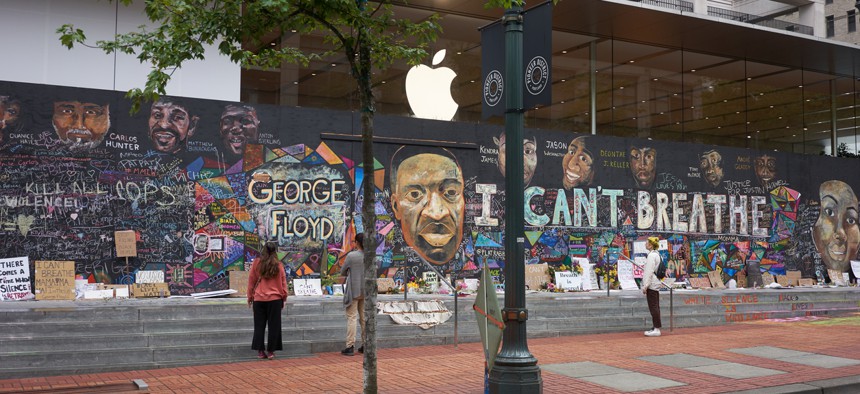Homelessness, Homicides and Hospitality: One City’s Ongoing Reputation Problem

istockphoto.com/hapabapa
Portland, Oregon, once a popular travel destination for business travelers, foodies and nature lovers, is struggling to regain its tourism footing after months of social justice protests and record crime rates.
Businesses and event promoters are wary of scheduling events in Portland as the reputation of Oregon’s largest city continues to suffer in the wake of prolonged protests, record homelessness and an uptick in homicides, tourism officials told the city council.
“Our central city occupancy in September lags behind every competitive city that we track except for Minnesota and San Francisco,” Jeff Miller, president and CEO of Travel Portland, told the Portland City Council at its Oct. 27 meeting. “Recovery is happening elsewhere, just not here.”
The report, commissioned at the request of the council, detailed data collected by a third-party travel and tourism research agency. The company asked people how likely they were to visit several dozen destinations, including Portland, for business or pleasure within the next 24 months. The most popular destination cities, Miller said, included Las Vegas, Orlando and New York City. Portland did not crack the top tier.
“In the most recent iteration of this study, Portland has declined to the lowest levels of being a likely destination,” he said. “We are now in the company of Kansas City and Corpus Christi,” a far cry from its previous counterparts of Seattle, San Francisco and Denver.
Part of the initial decline in tourism in the city was the effect of the Covid-19 pandemic, which decimated hospitality sectors across the globe. In 2019, tourism supported roughly 36,000 jobs in Portland, according to data presented by City Commissioner Mingus Mapps. Roughly a third of those jobs were gone by the end of 2020.
“Portland’s economy and culture will not recover from the covid downturn until Portland’s hospitality industry recovers,” he said. “Portland will not recover until we get these jobs back.”
But the decline is more complicated than the pandemic, Miller said. Two-thirds of people surveyed said their likelihood to attend events in Portland was “highly impacted” by the “visibility of racial and social protests” in the city, while more than half of meeting planners said their willingness to schedule conventions there was impacted “a great deal” by the same issue.
A New Problem
It’s a new and evolving problem for Portland, which experienced nine years of consecutive travel revenue through 2018 and had developed a reputation as a friendly hipster haven with a blossoming culinary scene.
But the city became an epicenter of protests in mid-2020 after police in Minneapolis killed George Floyd, with months of nightly events that sometimes turned violent. The majority of protests since have been peaceful, but flare-ups continue, including an incident last month where a crowd of 100 smashed store windows and lit dumpsters on fire, causing an estimated $500,000 in damage.
Dozens of similar events made national news, which Mayor Ted Wheeler said continues to hamper the city’s efforts at rebuilding and repairing its reputation.
“It never ceases to amaze and frustrate me that a bunch of kids with hammers can damage an age-old and positive reputation of an incredible city, but they can, particularly in a media environment where every single broken window becomes a national story,” he said. “And when they happen en masse as they did a couple weeks ago, it’s deservedly a national story. So that’s on us when it comes to public safety.”
Even events that have gone on as scheduled have not run smoothly. Commissioner Dan Ryan told the council that a friend who volunteered at a recent convention sent him a stream of text messages describing her discouragement at her interactions with attendees.
“She said it was really depressing to have so many people approach her that were angry that we allowed ourselves to even host a big convention—like we weren’t ready for it,” he said. “Many people felt unsafe. I think we just have to be honest about this truth.”
Future events are likely in jeopardy, Miller said, as the city “likely won’t even get the opportunity to bid on many conventions in the next two years, which will affect our long-term success well into the future.”
Converging Crises
Other crises, including a record-high number of homicides and an increasingly visible homeless population, are compounding the problem. The city, in conjunction with Multnomah County, are taking steps to address both problems, including an expanded public safety initiative and an increase in shelter capacity. There is ample funding available for both, thanks to a roughly $60 million budget surplus, Wheeler said.
“If our council keeps our focus on reducing unsanctioned homeless camps and finding humane alternatives and reducing the impact of homelessness on our community, and if we continue to work to strengthen our public safety function...I believe some of the economic recovery will follow,” he said.
The council will continue to divert funding to the tourism bureau as well, Wheeler said, but cautioned that the money would be better spent on programs with tangible results than on ad campaigns seeking to convince tourists that Portland remains a worthy travel destination.
“I’m not saying, ‘Stop your marketing,’ but right now, people don’t buy it. What they want to see is results,” he said. “There’s an old, old saying that it takes a lifetime to build a reputation and you can ruin it in an instant, and that’s true of cities as it is people. We’re just going to have to commit to that long-term process.”
Kate Elizabeth Queram is a senior reporter for Route Fifty and is based in Washington, D.C.
NEXT STORY: The American Workplace Isn’t Prepared for This Much Grief





